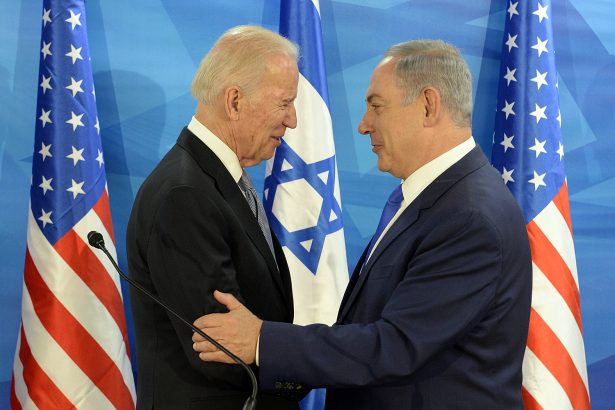Professor Yair Hirschfeld was a key architect of the Oslo Accords in 1993. In this review essay he assesses the policy frameworks being urged upon the new Biden administration to contain Iran and advance the Israeli-Palestinian peace process. Drawing on his extensive recent discussions with Israelis and Palestinians, he goes on to sketch policy framework and an action plan of his own, warning of the danger of repeating old mistakes by failing to build on what has been achieved in recent years.
I am grateful to Fathom for having asked me to review recent policy recommendations offered by think tanks and experts to the Biden administration. I do so as an Israeli fully committed to an Israeli-Palestinian two state agreement. The recommendations, I suggest, can be divided into two broad groups. One proposes to reboot an old framework from the Obama era; the other proposes a new framework. I conclude by suggesting a combination of policy proposals that can move the peace process forward.
First Policy Framework: Biden Should Update the Brookings Proposals of 2008
In 2008 the following policy framework was promoted by the Brookings Institution. Suzanne Maloney and Ray Takeyh proposed that to help stabilise the situation in Iraq, the US needed an understanding with Iran. Only with Iranian cooperation could Iraqi security and stability (and, in time, a US withdrawal from Iraq) be attained, they argued. The incoming US president was advised to immediately seek co-existence with Iran, and to see that ‘the quest for optimal leverage is a red herring’.[1] In proposing a policy addressing the Israeli-Palestinian conflict, Stephen Cook and Shibley Telhami advised the US to seek an understanding with political Islam and ‘Bring Hamas into the fold’ as well as strongly opposing any incremental approach to the Israeli-Palestinian conflict, demanding the US push for a final status agreement between the two parties.[2]
This 2008 policy framework conflicted with the essential interests of Israel, Saudi Arabia and the UAE who saw Iranian policies are having instigated the wars in Lebanon and in Yemen as well as contributing mightily to the polarisation and violence in Iraq. They feared the American diplomatic outreach to Tehran would result in further Iranian support for aggressive actions by Hezbollah, Hamas and the Houthis. For Israel, the suggestion that the US should try to ‘bring Hamas into the fold’ could only raise Palestinian negotiation demands and make any agreement non-achievable, creating another deadlock. The policy, Israel feared, would likely cause a destabilisation of Palestinian affairs, as had happened when Hamas had been brought ‘into the fold’ in the 2006 elections and after.[3]
Today, in 2021, some experts – Chatham House, the International Crisis Group (ICG), Martin Indyk, Avi Shlaim and Cindy May, among others – are advising Biden to undo the damage caused by the Trump administration by turning back to the package proposed by Brookings on 2008-9.[4] It seems probable that the left-wing of the Democratic Party, former diplomats who served under earlier administrations, Obama-era staffers back in the White House, and European allies of the US will assert their influence to return to those policies.
Second Policy Framework: Biden should adopt a new policy framework
Paradoxically, the same Brookings Institution itself is striking a very different note in 2021. It’s policy proposal, ‘A new US Strategy for the Israeli-Palestinian Conflict’ stresses the need ‘to preserve the stability and security of US partners’; to ‘pursue concrete steps to meaningfully improve freedom, security, and prosperity for Israelis and Palestinians, and advance the prospects of an agreed two-state solution to the conflict over the medium term.’
Brookings now argues that the Abraham Accord agreements ‘may create new opportunities over time for Israeli-Palestinian peacemaking, (but) they will not transform a conflict that is ultimately between Israelis and Palestinians and not the Arab States.’[5] We should also pay close attention to the comments of General (res.) John Allen, the president of the Brookings Institution, and the first semi-official envoy of President Biden, made to the Annual Conference of the Israeli Institute for National Security Studies (INSS).[6] He stressed that the American military presence in the Gulf would go hand in hand with supporting Israeli security interests and upgrading the security of Saudi and Arab Gulf states against attacks by Iran or its proxies. Should such attacks happen, he made clear, the US Navy had prepared a bank of Iranian targets aimed to deter and if necessary, retaliate against any possible Iranian aggressive action.[7]
It was announced simultaneously that Israel was being included within the jurisdiction and responsibility of CENTCOM. This would allow for close Israeli-Arab, Gulf states-Jordanian and Egyptian security cooperation under the umbrella of the regional NATO command.
In what appeared to be an effort to achieve ‘balance’, and not frighten Iran, it was also announced that the new administration was pausing delivery of the F-35 fighter jets to the UAE and arms to Saudi Arabia. And in response to the Iranian request to start talks on the renewal of the JCPOA immediately, Tony Blinken, the Secretary of State, said ambiguously that the time had not ‘yet’ come to do so. [8]
The new policy framework urged by the Brookings Institution in 2020 is followed by a wide range of experts.
On Iran
The Washington-based Atlantic Council,[9] together with the Abu Dhabi-based Emirates Policy Center, and the Tel Aviv-based Institute for National Security Studies (INSS), stress the need for the US to ‘curtail Iran’s nuclear ambitions and regional aggression’ and suggest the US ‘establish an official channel for multilateral dialogue with the Gulf states and Israel, possibly adding Egypt and Jordan, with the expressed goal of finding ways to mitigate threats from Iran, which include nuclear proliferation, hostile intervention within the region and beyond, ballistic missiles, cyber operations, and disinformation campaigns.’ They conclude: ‘Returning to the Joint Comprehensive Plan of Action (JCPOA) should be done only in conjunction with aligned efforts to secure Iran’s commitment to correct the outstanding points of contention.’
Sima Shine and Eldad Shavit of the INSS have suggested the US freeze the current situation in return for easing Iranian oil exports, in conjunction with starting a discussion on problematic issues in the agreement. On the nuclear issue three demands are essential: an extension of the sunset clause for at least 30 years, including an examination every five years on adherence and possible extension; freeze any research and development of new centrifuges and demand ongoing supervision of the IAEA. On the regional issues: deter Iranian regional aggressive action and, if case Iran does not comply, take harsh action.[10]
It seems that that the inclusion of Israel in CENTCOM, the time being taken by the US before starting negotiations with Iran, and General Allen’s reference to ‘the bank of Iranian targets’ to be hit in a proportionate response to Iranian aggression, are all in line with this proposed policy approach.
On Israeli-Palestinian Peace
The Atlantic Council, Emirates Policy Center and INSS propose that Biden ‘restructure Israeli-Palestinian peace efforts, rehabilitating a durable two-state outcome that establishes political, territorial, and demographic separation between Israel and the Palestinian Authority (PA) through transitional arrangements.’ Gershon Baskin, an Israeli peace activist advises the Biden administration to reach understandings with the Israeli government to curb settlement activities outside of the settlement blocs, while encouraging the Israelis and Palestinians to negotiate directly with each other, without outside mediation.[11] Hussein Ibish also stresses the need to stop settlement activities, while encouraging other Arab states to ‘engage diplomatically with Israel’.[12] A proposal by two Israelis and two Palestinians suggests an International Incentive Package is constructed for the pre-negotiating phase, addressing the issues of security, recognition and legitimacy, religious rights, economic prosperity and domestic needs, conditional on the acceptance of a shared vision of an Israel-Palestine agreement.[13] This dovetails with the recommendation of the Brookings Institution ‘to take immediate steps to address the humanitarian crisis and economic challenges facing the West Bank, East Jerusalem, and Gaza.’
A policy framework that can work
It is clear that two important drivers of a future US Middle Eastern policy will be the search for an understanding with Iran in order to prevent the country from attaining a military nuclear capacity and keeping alive the option of an Israel-Palestine two-state solution. A renewal of Israel’s confrontational policies aimed at undermining these two aims, can only cause damage and bring about Israel’s regional and international isolation, a thought I will not pursue further here. As regards US policy, I suggest it is possible to combine elements from the policy frameworks being urged on the new US administration to create a coherent policy.
- ‘To Restructure the Israeli Palestinian Peace efforts.’[14] The old orthodoxy, that the US seek full agreement on all core issues of conflict – Jerusalem, refugees, settlements, borders, security – on the basis of ‘nothing is agreed until everything is agreed’ has failed repeatedly. What is needed instead is an upfront commitment of both parties to achieve a two-state agreement; to be followed by agreed intense Palestinian state-building and the introduction of conflict transformation practice to each of the core issues to create movement towards a final agreement.
- ‘To curb settlement activities outside of the settlement blocs’[15] and create ‘economic incentives’[16]. I suggest that these two tasks can be combined. The UAE created the Abraham Fund together with the US. Both sides pledged $1.5bn in order to finance the physical infrastructure of the emerging State of Palestine and create the necessary conditions for an annual two-digit Palestinian growth rate. This would expand Palestinian presence also in Area C and halt further settlement expansion, without denying the essential needs of the existing settlements. This approach offers an ‘achievable Zone of Agreement’ between the PA and even a right-wing Israeli government, while possibly requiring some US pressure. Previously, optimal demands on Israel were normally combined with minimal or no pressure. Now, minimal demands can be asserted with maximal pressure, offering a greater probability for success.
- ‘Encourage other Arab States to engage diplomatically with Israel’.[17] Peace understandings with Saudi Arabia are of special importance to Israel, while Riyadh can be expected to demand reference to the Arab Peace Initiative. This has been included in UN Security Council Resolution 1515, regarding the three-phased Benchmarked Roadmap to Peace in the Middle East. The Israeli government did accept the resolution with several reservations. The Palestinian leadership requires not only Arab political, diplomatic and financial support, but also the reference to the Arab Peace Initiative.
- ‘Ask Israel and the Palestinians to get back to direct negotiations’.[18] They do not need Terms of Reference for a final agreement. However, they must reach a mutual Israeli-Palestinian understanding on how to start negotiations. I discussed this with Abu Ala (who formerly served as Palestinian Prime Minister). He argued that three conditions were essential: (1) a commitment to negotiate the issues of Borders, Jerusalem, Security, Water, Prisoners, Economic Relations, Collaborative Relations, Dispute Resolution, Mutual Recognition and Refugees; (2) an understanding to strengthen the Palestinian Authority and (3) an economic package.[19]
These broad recommendations can be translated into a US action plan. The Biden Middle East team has successfully reached out to Israel and its Arab allies on the Iran issue, as well as to the Palestinians on the issue of the peace process. These are the next steps that should be considered.
Immediate Action
Conclude with Israel, Egypt, Jordan and the Arab Gulf States an understanding on how to renew negotiations with Iran, largely in line with Sima Shine’s and Eldad Shavit’s proposals. Independently, allow the forthcoming donor meeting (scheduled for 23 February 2021) to provide effective relief to the Palestinian economy, in coordination with Israel and its Arab peace partners.
Short Term Action
Seek understandings with Iran, while fully maintaining America’s and its allies’ deterrence and retaliatory capacities. In the Israeli-Palestinian arena, develop a comprehensive Palestinian state-building plan and achieve the necessary mutual commitment for its implementation, as well as the essential financial, economic and technical support. Encourage Israel and the Palestinians to commit to a two-state solution and conclude (without third party interference), an understanding necessary to start negotiations. This should prepare the ground for the renewal of Israeli-Palestinian peace negotiations, hopefully even before the end of the first Biden year.
Medium Term Aims
Help the parties to reach an Israel-Palestine agreement creating a two state reality, without solving all core issues of conflict and without committing to ‘finality of claims’. Religious Jews and Muslims believe that all of Eretz Yisrael / Palestine was given to them by God. They can accept a peace agreement, but they cannot be expected to support a change to God’s will. Ofer Zalzberg has explained why the demand for ‘end of conflict’ and ‘finality of claims’ is not achievable. About the success of the Northern Ireland peace process the UK government’s negotiator Jonathan Powell has explained that ‘In essence the Good Friday Agreement was an agreement to disagree’. He noted that ‘Neither side had given up their aspirations. But they had agreed that both would pursue those aspirations by peaceful means rather than by violence.’[20] Such an understanding has to be combined with supportive arrangements, as how to reach the endgame. The US peace team should aim to conclude, towards the end of the second Biden year, an agreement on implementing whatever has been agreed by then.
This will have to include agreed tools to allow the US to assist the parties in achieving further supportive understandings, on a conflict transformation-cum-conflict resolution basis, on the way to the endgame.
Do not repeat old mistakes in new bottles
The likelihood of an unintended return to the mistakes of the past is unfortunately relatively high. The problem is not the specific recommendations of the International Crisis Group,[21] of Avi Shlaim[22], of Chatham House[23], of Cindy May[24], or of Martin Indyk.[25] The problem is that most decision-makers and diplomats whether in the US, in Israel, in the Palestinian territories or elsewhere, mainly believe what they wish to believe, rather than listening and grasping what might be achievable. This creates an unfortunate pattern of behaviour. In expectation of change, expectations for a peaceful development are created by showing good will. This is sustainable until the first clash of interests occur. Then the natural tendency is to fall back into bad habits of believing one’s own truths, instead of listening to the other.
The initial commitment of Secretary of State Tony Blinken to ‘do no harm’[26] is useful in lowering expectations. Alas, if it becomes an alibi to refrain from necessary action, it will be a recipe for renewed tragedy.
References
[1] Maloney and Takeyh, A New US Policy toward Iran”’ in: Restoring the Balance – A Middle East Strategy for the Next President, Brookings Institution, Washington D.C. 2008, the quote is on p. 75).
[2] Stephen A. Cook and Shibley Telhami, ‘Addressing the Arab-Israeli-Conflict’ in ibid. Quotes are taken from p. 151 and 153.
[3] Bringing ‘Hamas into the fold’ in essence meant to accept the ‘moderate’ Hamas position for negotiations as legitimate. Whereas the radicals demanded to continue the military struggle, the ‘moderates’ demanded full Israeli withdrawal to the 1949 armistice lines and the total evacuation of Israeli settlements and military installations as against time-limited non-belligerency agreement. On such conditions no zone of possible agreement would be achievable. It remained also most questionable, whether US pressure would be either willing or capable of bridging the gap. see: Y. Shabath, Hamas and the Peace Process – To what Extent does Hamas Act to Undermine Reconciliation? Jerusalem-Givat Zeev, 2010, op.cit. p. 232.
[4] See: Richard N. Haas and Martin Indyk (eds), Restoring the Balance – A Middle East Strategy for the Next President, Brookings Institution Press, Washington D.C. 2008.
[5] Ibid.
[6] General John Allen served 2012-2013 as Special Security Envoy of Secretary Kerry to the Middle East.
[7] See INSS Annual Conference, 27 January 2021
[8] Interview with CNN, 9 February 2021.
[9] The Atlantic Council aspires to be bi-partisan; the former executive vice-chairman was General James Jones, who served as President Obama’s National Security Advisor; the present executive vice-chairman is Stephen Hadley, who served as President George W. Bush’s National Security Advisor.
[10] See: Eldad Shavit and Sima Shine ‘Returning to the Nuclear Agreement: Implications for Israel’ in: INSS Insight No. 1423, 11 January 2021.
[11] Gershon Baskin ‘How should Joe Biden deal with Middle East Issues?’ https://www.jpost.com/opinion/how-should-joe-biden-deal-with-middle-east-issues-opinion-648809
[12] Hussein Ibish ‘What Biden should do about Israel and Palestine’. https://www.bloomberg.com/opinion/articles/2020-12-16/what-biden-should-do-about-israel-and-palestine
[13] See: Lior Lehrs, Moien Odeh, Nimrod Goren and Huda Abu Arquob ‘Addressing Needs, Promoting Peace: A Proposal for an International Incentive Package for Israeli-Palestinian Peace’ Friedrich Ebert Foundation, Tel Aviv, February 2021.
[14] Point Five of the Atlantic Council, Emirates Policy Center and INSS recommendations.
[15] Gershon Baskin op.cit.
[16] FES recommendations of Nimrod Goren and Huda Abu, as well as the recommendations of the Brookings Institution.
[17] Hussein Ibish ‘What Biden should do about Israel and Palestine’ op.cit.
[18] Gershon Baskin ‘How should Joe Biden deal with the Middle East issues’ op.cit. The full quote reads: ‘The best thing that the US can do for Israel and the Palestinians is to let them both know the US expects them to get back to direct negotiations…The US should always be prepared to offer support, politically and materially, when the parties require it to close agreements and to implement them. … The US should strongly encourage the Israelis and Palestinians to reengage and utilize their regional partners, rather than Washington, to assist.’
[19] Such understandings have been discussed in much detail on a track-two level; and we have gained a detailed understanding of what is needed to reach the zone of achievable agreement.
[20] Ofer Zalzberg “Beyond Liberal Peacemaking: Lessons from Israeli-Palestinian Diplomatic Peacemaking” in Review of Middle East Studies; 53 (01) May 2019.’ Jonathan Powell, Great Hatred, Little Room – Making Peace in Northern Ireland; Vintage Books 2008. p.108.
[21] The ICG / USMEP Report https://d2071andvip0wj.cloudfront.net/icg-usmep-statement-15xii20_0.pdf
[22] Avi Shlaim – https://foreignpolicy.com/2020/12/22/if-biden-wants-israeli-palestinian-peace-he-must-break-with-the-past/
[23] Chatham House https://www.chathamhouse.org/2020/11/five-key-questions-bidens-middle-east-policy
[24] Cindy May https://www.e-ir.info/2021/01/01/opinion-israel-palestine-policy-under-biden/
[25] Martin Indyk – https://www.nbcnews.com/think/opinion/biden-can-clean-trump-s-israeli-palestinian-policy-mess-not-ncna1247996
[26] Quoted by Cindy May op.cit.





































